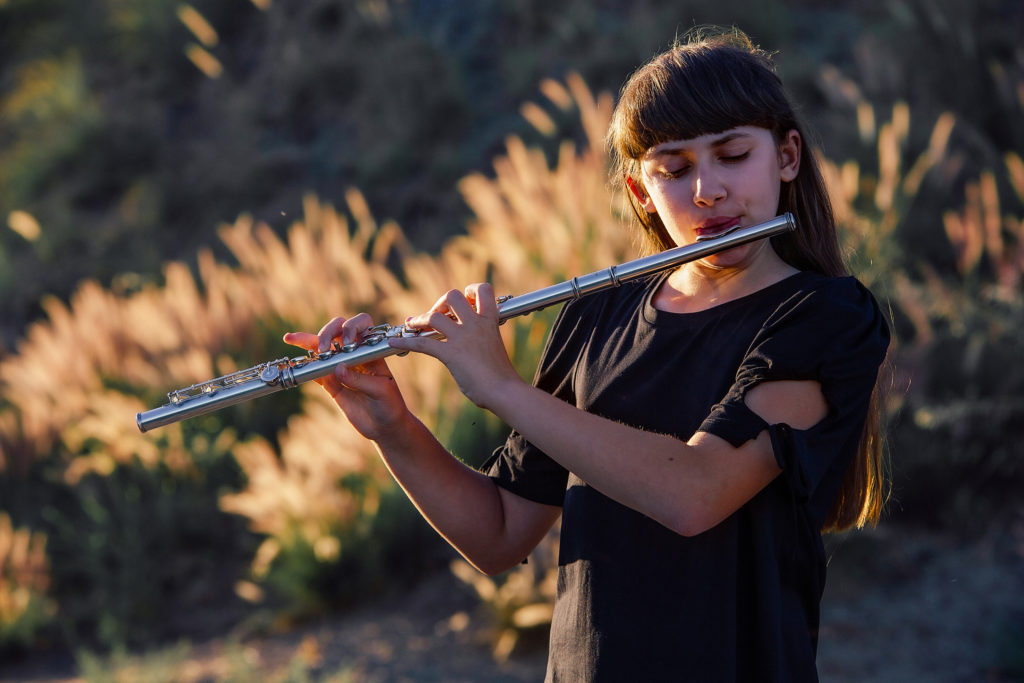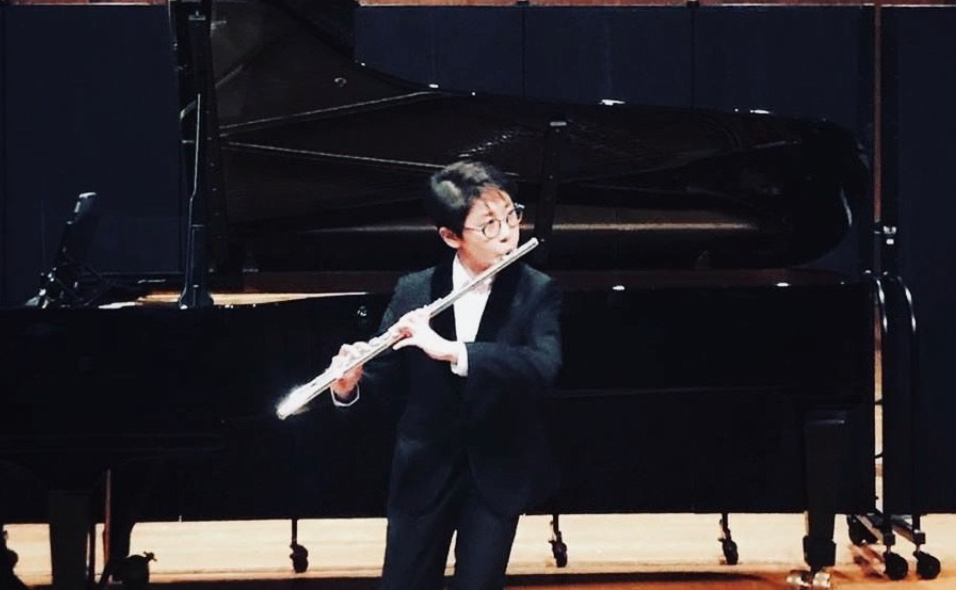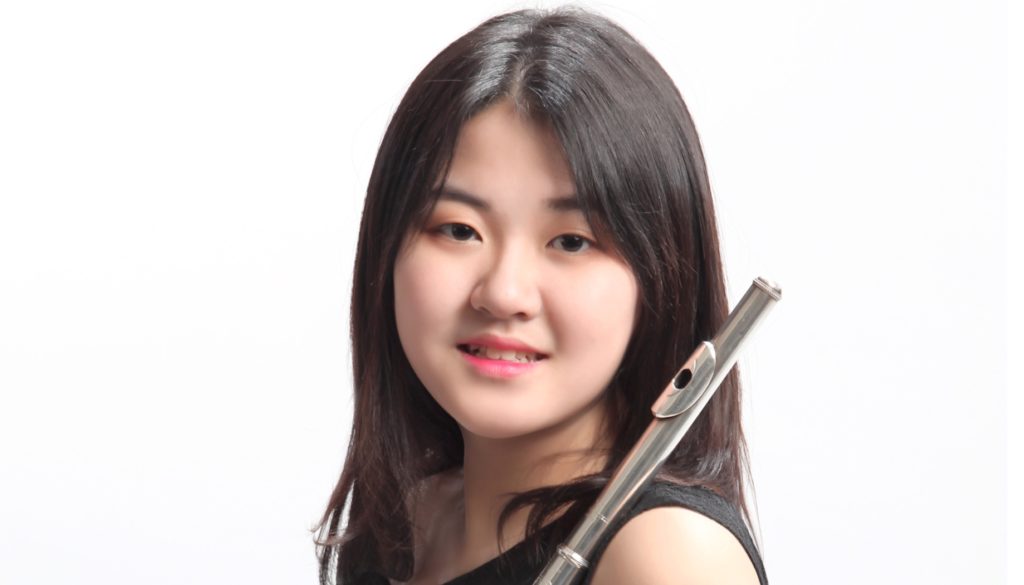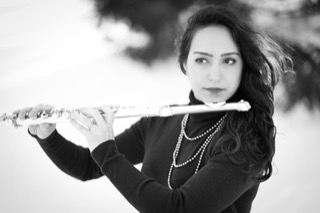Introducing the Winners of the San Francisco Flute Society Competition 2020
Director of the San Francisco Flute Society, Viviana Guzman, had to cancel her annual Flutes by the Sea Masterclass, but decided to move the accompanying competition online. All of the sudden, what was a Bay Area Competition, turned into an International Competition with the talent levels shooting off the charts! We had no idea what to expect, and we were thrilled with the results. There were competitors from Vietnam, Iceland, Ukraine, South Korea, New Zealand, Chile, Russia, USA, etc. There were so many beautiful and inspiring entries! We all felt a bit overwhelmed by both the number of applicants and the extremely high level.
The First Prize winners Artist Interviews are listed before. Once again, congratulations to all who applied!
First Prize Division One Grade 6 and under: Nikka Gershman-Pepper
At age seven, Nikka Gershman-Pepper, discovered a true love for flute and composing. A year later, she was one of the youngest musicians to have been invited to perform with the Emmy-winning Honor’s Orchestra at UCLA Schoenberg Music Hall Concert. Subsequently, she was offered the position of principal flute in The All Schools Elementary Honor Orchestra. In 2017, she was accepted to Jim Walker’s “Beyond The Masterclass” held at The Colburn School. In 2018, Nikka was selected to perform a flute solo at Carnegie Hall for the Winner’s recital of The American Protégé International Music Competition. Most recently, at eleven years of age, Nikka won the concerto soloist competition for the Rio Honda Symphony (Whittier Regional Symphony). Additionally, she has been accepted as a soloist in the LA Youth Philharmonic for the 2019 Music Festival LA Summer Concert at The Walt Disney Concert Hall and Winter Concert at Colburn’s Zipper Hall. Nikka is a bright academic student and was invited to join MENSA society and the John Hopkins Center for Talented Youth at age seven. She was also accepted to The Davidson Young Scholars program. Nikka currently studies with Diana Morgan, orchestral flutist and faculty member at the Colburn Community School of Performing Arts.
How did you start playing the flute?
Somehow, the flute came to me in a dream. When I woke up that morning, I begged my mother to buy me this magical instrument. She thought that I was just asking for another toy, but I was serious, and I kept asking her relentlessly to get it for me. After about three weeks, she caved in, and soon after, a large box was sitting at our front door. My musical journey started at that very moment.
Who were your music mentors? and what did you learn from them?
I am blessed to have an amazing teacher and musician, Diana Morgan, who has been supporting me for many years. I have learned so much from her about technique and professionalism. My first mentor, Mandy Fey, however, was not actually a flutist: she plays clarinet and was the band director at my school, and even though I was a beginner, she believed in me and guided me to join my first orchestra. I am forever grateful to her. My favorite flutist is Marcel Moyse, and I listen to his records from the early 20th century every day. He constantly inspires me to “play music, not the flute.” Recently, I was fortunate enough to correspond with Trevor Wye, and his practice books are helping me so much. I love how he combines humor and seriousness into the art of music.
What do you like best about playing the flute?
The flute feels like it’s an extension of myself, and it comes naturally to me. This piece of metal can conduct not only sound, but also emotions, narratives, and life experiences. When the lips, the lungs, the fingers, and the feeling come together, in the best moments, I sense a presence of magic.
What are your goals personally? Professionally?
I see myself dedicating my life to music. If I close my eyes, I can fast-forward in time to walk the concert halls of the Paris Conservatoire, my dream school. I even started learning French so I can feel at home! I hope to travel the world with my instrument taking me to different venues so I can share my music to inspire others. I have also been composing music since I was five years old, and my goal is to create an opera.
What inspires you the most in life?
I have an amazing family that always inspires and supports me. My grandfather, Yura, will sit for hours listening to me practice and even though he is a doctor and not a musician, he has a great ear and heart, and always gives me amazing advice. My grandmother, Susia, opened the world of literature and film to me. We watch Fellini, Hitchcock, Woody Allen, and Mel Brooks together. We also read Russian classics. My mother, Zhenya, is a visual artist, and I grew up smelling her oil paints and going to museums with her. From my dad, Evan, I learned about other types of music besides classical, including fusion, jazz, and progressive rock. My grandmother Mema taught me the art of cooking. Our baking traditions go back since I was four years old. I try to incorporate all of the loving energy and knowledge of my family into music.
What has been your greatest challenge?
It was hard to fit in my practice with an overload of homework from school. I would have to go to sleep and say, “Oh I’ll just do it tomorrow.” The way I overcame this challenge was by re-discovering my favorite recordings and thinking, “I want to be like that!” All of a sudden, practicing became pleasurable and fun, and not just yet another chore. This new attitude led me to participate in many concerts and competitions. I am so grateful to the San Francisco Flute Society for hosting an amazing international competition. The level of participants was so high that I was honored to be considered among such great musicians!
Can you give us 5 quirky, secret, fun, (don't think too much about this) hobbies or passions?
Five hobbies right off the bat are: sports (especially soccer and tennis), geography (I love learning about obscure facts and I even won the school geo bee), animation, poetry, and filmmaking/photography. One of my secret collections is small critters who I call “Zaichiki,” which is Russian for “bunnies”. Each has a family, a house, and many stories. If anyone refers to them as toys, the war is on!
What 3 things would you offer as advice for a young flutist?
It’s funny to think what advice I would give to young artists, as I am only 12 myself. I am happy to share three things that helped me:
- Having musical idols that I look up to. By listening to fabulous recordings, I can set goals for myself to improve.
- Try to develop your own style of playing! Don’t copy other recordings. You can be influenced by them, but being just a duplicate is never a good thing.
- Don’t practice because your family makes you. Practice because you yearn to improve and be the best you can be. Sometimes, I’ll admit, you need to “force” yourself to take your flute out of the case, but once you start, you’ll be on a roll again.

First Prize Division Two, Grades 7, 8, 9: Louis Liu
My name is Louis Liu, and I am twelve years of age. I have a determined and resolute passion for flute playing. I commenced my flute study at the age of seven; thus, I have played this instrument for five years. I passed my ARSM with distinction two years ago. Last year, I won the first prize in the international Australia Young Artists competition for under 18years old. I played the Mozart D major Quartet for flute with members of the Auckland Philharmonic orchestra; furthermore, gaining myself an opportunity in the past year to perform in Carnegie Hall.
Division Two First Place Winner Louis Liu, New Zealand
My mum was a flutist. Since I was five, I often heard her students play and I thought it wasn't right not to give it a try. Once I did give it a go though, I really liked it.
My first teacher was my mum. She taught me that to achieve anything, one has to go through hard work. My current teacher Philipp taught me to think deeply when I play the flute. He taught me to identify evidence and reasons for the way I play.
I believe that, by far, the best thing about playing the flute is the sound quality. I generally think it has the richest tone of all instruments.
My goal is to be an international soloist as well as being part of a decent orchestra.
My biggest inspiration are my goals. My goals inspire me, for they give me a reason to continue striving for the best.
Self-control, discipline and perseverance are my greatest challenges. I always need to keep these three traits in my mind whilst I play flute.
1. I like skiing
2. I like architecture
3. My cat is one of my biggest inspirations. He inspires me to perservere, because he always perseveres to get food from me.
4. I really enjoy reading
5. I really enjoy writing
Quality, not quantity. Set the foundations before going into small details. Nervousness can sometimes be a positive thing. these. are my three pieces of advice for young flutists.
Thank you for your time to read my interview.

First Prize Division Two, Grades 7, 8, 9: Minkyoung Kim
Minkyoung Kim is a fiftenn-year-old flutist from South Korea, currently studying with Professer Soyeon Kim. In 2016, Minkyoung was admitted as the youngest student into the Korean National Institute for the Gifted in Arts, and in 2018, she entered Yewon Art Middle School at the top of her class.

Division Two First Place Winner Minkyoung Kim, South Korea
1. My aunt is a pianist, so I started playing the piano since I was three years old. When I was seven years old, my elementary school required the students to learn an instrument. My mother recommended the flute because it is pretty and portable. It was a simple idea. Consequently, I enrolled in an after-school flute class. At first, it was very difficult to make sound, but the instructor recommended that I participate in a school competition, saying that I seemed talented. I won first place in the first- and second-grade competition. The instructor told me that since I was young, it was bold of me to showcase my skills in front of a lot of people and that I had excellent skills. The compliment gave me confidence. This experience was greatly influential on my decision to choose the flute as my life partner. I began working with pieces instead of etudes in order to participate in competitions, and the overwhelming emotion that came with finishing a piece captivated my young heart.
Moreover, the happiness I felt when people paid attention to me onstage and complimented me on my prowess made me want to continue enjoying this joy in the future. At that moment, flute became my path.
2. My mentor is Professor Soyeon Kim, who showed me what good sound should look like. I disliked the sound of the wind when I played the flute, so I would often make artificial sound without even realizing it was wrong. I was unaware of my weaknesses because growing up, the only feedback I received from people around me was that I was good. Other teachers sometimes pointed out that detail about my sound, but I ended up playing the wrong way again. Professor Kim taught me that a truly good sound is a sound that can change according to the music. She showed me photos and videos of virtuoso and told me to look at how their sounds varied depending on their posture. Until then, I’d found it difficult to do this because my muscles were frequently tensed up, but Professor Kim helped me refine my skills. Instead of criticizing me directly, she let me identify and improve my own areas of weakness. She also taught me that it is important to express the feelings and thoughts that the song wants to convey. Since then, I've been checking and fixing my habits myself.
3. I love playing in front of a large, attentive audience. When I see within the audience’s eyes that they are relating to my music, I am truly happy.
4. Personal goals: I wish to be fluent in many languages such as English and German. This is because I want to communicate with people from all around the world.
Professional goals: I aspire to perform with the Berlin Philharmonic. I have a picture of the Berlin Phil principal flutist in my room, and I even took several pictures in front of the poster.
5. My friends, who I got to know at the Korean National Institute for the Gifted in Arts, inspire me the most. Before I met them, I had thought that I was a very skilled flutist, but after seeing them place in international competitions and work hard, I initially lost some confidence because I was humbled. However, this motivated me to try harder, making me realize how I could improve.
Also, I liked the fact that even though my friends from regular schools didn’t understand why I rarely relaxed even on weekends, my friends at the institute understood my life, as they were also people that were pursuing dreams in specialized fields. Through my friendship with them, I came to know what adults mean when they call people “like-minded”.
6. I overcame my biggest challenge when I was admitted into the Korean National Institute for the Gifted in Arts (KNIGA) as the youngest student at age 11 and when I entered Yewon School at the top of my class. KNIGA was a challenge because there weren’t any age groups or limits in the admissions process: in order to enter as the youngest student, I had to outperform middle and high school students who were much older and more experienced than I was. To achieve this goal, I practiced all day long: other than eating, sleeping, and using the restroom, the only thing I did was practice. Although I practiced the same pieces for months, I wasn’t deterred because my heart was set on passing the entrance exam. During this time, I was able to learn how to set my mind to something. As for Yewon School, after hearing that there had never been a wind instrument major at the top of the class, I strived to break that preconception. Because I was very intent on accomplishing this goal, I worked hard, often without even sleeping. I also had to study several academic subjects thoroughly since there was also a written exam. For the first time in Yewon history, I became a wind instrument major that was at the top of the class. I was so happy I couldn’t even believe it.
7. I'm into baking these days. My mom has registered me for a few one-day baking classes, so I am making various desserts whenever I have time. I recently baked a cake and some macarons and ate them with my mom.
Also, I like to read. I mostly like reading novels because reading lets me get rid of distracting thoughts, and I enjoy being immersed in the stories. Being immersed in a character helps me express emotions when I play the flute.
I've taken pleasure in keeping a diary—especially writing and decorating mine—since last year, so I enjoy buying pretty stickers and pens to decorate it.
I also find it fun to learn about composers and analyze songs through music theory and harmony. It makes me feel as if I’m solving puzzles or navigating a maze.
I also enjoy making slime. I sometimes watch slime videos and buy slime.
8. Ever since I was a child, I strived to win first place, playing pieces that were advanced for my age in order to prepare for competitions; I hope young flute players won’t be preoccupied with the thought of winning and instead realize that enjoying music is more important. This is because I realized later that I lacked some fundamental skills because I focused on difficult pieces, and it was difficult to build them up again. I also slipped into a slump because of this problem. I hope young flute players will enjoy playing the flute more without being stressed. Finally, self-care, such as looking after your health, is essential as a performer.
Division Three First Place Winner Yaroslav Vodovozov, Ukraine
Yaroslav Vodovozov (16 years) is student of R.Glier Kyiv State Higher Music College. His teachers are Olena Dimitrova and Anna Kuzmenko. He took a part in many concerts and international competitions including such as IX International Competition for Young Flautists "My Favorite Flute" (Russia, Moscow) I prize and the audience award, I International Competition for Young Flautists – (Germany, Wetzlar) I prize, Third International Flute Competition" – (Varna, Bulgaria) I prize, The Flute Days Munich. He took part in masterclasses with Barbara Svyatek-Zelazna, Мaria Semotyuk, Zoya Vyazovskaya, Sibel Pensel, Matthieu Gauci-Ancelin, Ana Maria Ribeiro, Caroline Debonne, Mauricio Lazano, Andrea Lieberknecht, Maxence Larrieu, Sarah Louvion, Felix Renggli, Silvia Careddu. He got the ukrainian government scholarship. He has been funded by Vere Music Fund for competitions and masterclasses since 2017.
1. I found out about the flute from my god brother that played it at the time and I fell in love with the instrument and the sound so we started attending classes together.
2. I studied with Elena Dymytrova than Anna Kuzmenko. My teachers both took a very big part in my growth. The taught me musicality, phrasing, how to play with different kind of sound for different styles in music, techniques and last but not least confidence on stage. Apart from being my music mentors they were also always my great friends which always supported me and motivated me to do better!
3. I like to play any kind of music from baroque to modern but I like playing the music written specifically for flute the most.
4. I was born into a music family so I think I always had a feeling that I might like doing music too. And as soon as I found my instrument I realized I want to become good at it and make it my profession.
5. I get inspired by the music I play. Every piece is so unique and needs a special approach. That always motivates me to learn more about the piece, composer and era (or style) it was composed in.
6. When I first started playing the flute I had a bad posture which made it difficult for me to improve my playing and techniques. It took me a long time to change it but, luckily, with good help I managed to do it.
7. I have a couple of hobbies that I like doing in my mean time. I am very interested in fashion, not long ago I started learning the guitar and I've been long boarding for a couple of years.
8. My advice to beginners would be to take a part in competitions and masterclasses as well as working on your confidence (on stage especially).
First Prize Adult Division: Jeiran Hassan
Dr. Jeiran Hasan is Instructor of Flute at Western IL Univ., holding degrees from the Univ. of IA and the Cleveland Institute of Music. Principal of the Knox-Galesburg Symphony, she has also competed in 20 competitions including the NFA’s Orchestral and Young Artist Competitions. www.j-hasan.com
Adult First Place Winner Jeiran Hasan Illinois, USA
How did you start playing the flute? Who were your music mentors? and what did you learn from them?
My father is a retired musician from Azerbaijan who spent most of his career in Moscow during the Soviet Union. I always grew up listening to traditional Azerbaijani and Russian music and hearing my father’s recordings and stories of his jazz ensemble. He was also a former orchestral musician, and it is because of him, I first heard the symphonies of Tchaikovsky, my favorite composer. Music is in my blood and it was no surprise that I was interested in singing in choir or wanting to play an instrument. I originally wanted to play the bassoon like my father did, but fell in love with the flute’s sound and ease of transport. My parents both pursued second careers after moving to the United States, and it was impossible for my family to afford lessons, so my father was my main teacher from nine to 15 or so and honestly, he still gives me teacher advice to this day! Although he didn’t play the flute, his experience playing bassoon and being a versatile musician while also knowing my particular strengths and weaknesses, provided for a wonderful music making background. He taught me everything, but most importantly, he taught me how to be a musician and to always focus on the music. He was trained in the strict Russian style, so for the first few years of my training, that is how I was taught too. Scales and etudes were a priority, but sight-reading built up the bulk of my daily practicing. I still love challenging myself by opening up something new and playing it as accurately as possible at tempo.
Through my three degrees, summer festivals, and overall music making, I met many wonderful musicians, teachers and mentors who have shaped me to be the musician and person I am today and I feel forever indebted to them, the lessons I’ve learned, and the experiences I have had. I feel so incredibly thankful for the opportunities that have come my way!
What do you like best about playing the flute?
The flute is the best instrument because it is so versatile. We have wonderful repertoire and I feel fortunate to experience the diversity of the instrument. One of my favorite things is premiering new works by contemporary composers or exposing colleagues and audiences to repertoire they might be unfamiliar with. Of course we love our classic, traditional standard repertoire, but there is so much more music out there waiting to be heard!
A few flute specific favorites for me are that I love the leadership role of the instrument. Additionally, I love the palate of colors at our disposal, the extended techniques and other sound effects we can make. The flute teaches me to keep learning and exploring everyday-it is almost impossible to get bored experimenting with colors, etc. That’s also my favorite part of teaching the flute-I love being a part of my students’ journey on exploring their own personal playing capabilities.
What are your goals personally? Professionally?
Professionally, I want to continue teaching at a university and hope to one day find myself in a tenure-track position. I love teaching and believe that every student and musician deserves the best education they can receive. My goal is to be the best educator and role model I can possibly be and to inspire and motivate my students to be the best, while also emphasizing personal and human growth. Career paths may change, but we are first and foremost human beings and we shouldn’t forget that. I also love world music, especially the music of Azerbaijan and the former Soviet Union. I wrote my DMA essay on Azerbaijani flute music and it is my hope and dream to republish the music, record it, and become a musical representative or ambassador of this music in the United States and world.
Personally, I want to keep improving myself to be the best person I can be. I love learning about new things, non-music and music related, and am still teaching myself to trust in myself and my abilities and to be patient.
What inspires you the most in life?
Quite honestly, competition is one of the best ways for me to stay motivated and inspired. It is key to my personal achievement and satisfaction. Competition is a broad word and on any given day, stretches from music competitions to personal competitions within my own being to keep making myself a better person, friend, musician, and flutist. Competitions inspire me to keep practicing, but mostly, to challenge myself to exceed my expectations and hold myself to the utmost highest standard and level.
What has been your greatest challenge?
I do not believe in one particular challenge. Our lives expose unique challenges and obstacles that we music learn to overcome on our own time and on our own path. Currently, we live in a very difficult time where it is hard to be motivated. This is due to private life pressures, society, etc. As musicians, we are so used to engaging with audiences, working one-on-one with students and colleagues, so it is tough to still keep the motivation to play and make music. My current challenge is learning how to stay motivated with fresh and creative ideas that don’t sacrifice myself or my integrity.
Can you give us 5 quirky, secret, fun, (don't think too much about this) hobbies or passions?
I am not afraid to profess my love for cheesy christmas/holiday movies! That’s also due to the fact that I love cold weather-the colder and snowier-the better. Besides that, I really enjoying spending time with animals, especially dogs, and reading, but also, hosting dinner parties and cooking and baking.
What 3 things would you offer as advice for a young flutist?
1. be YOU. Don’t pretend to be someone else. Find your own voice, stick with it and show your true self. Always remember that people come to your performances to hear and support YOU and your interpretation. They could easily go to a store or download someone else’s recording.
2.own the stage. The stage is your kingdom. It’s important to attract the audience to you. Commit to your playing and sell your performance. After researching the piece, the composer, historical background and understanding of the piece, for a performance, we are the liaison between the instrument and the composer’s ideas. Tell your story, show the audience your interpretation. This is the moment to let your artistry shine. On a similar note,
3. take risks. Many, many, many risks! Make mistakes-we are all still learning. As the famous cellist and FLUTIST Pablo Casals once said on being asked why, at the age of 93, he devoted three hours a day to practicing, “I’m beginning to notice some improvement; I’m making progress."

